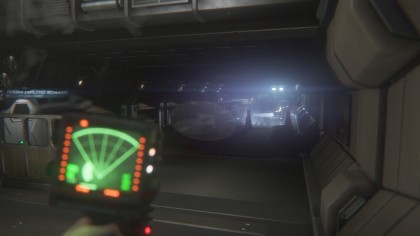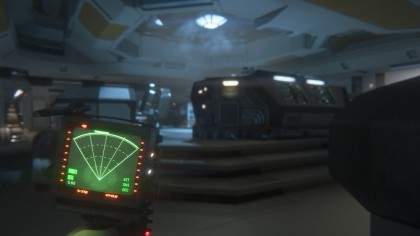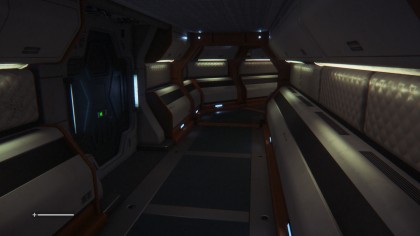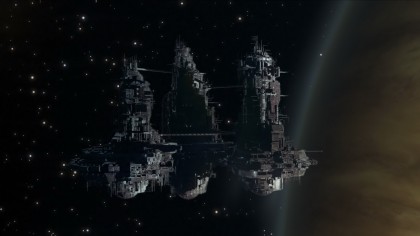How the tech of Alien Isolation will scare you back to the 1970s
In space, no one uses touchscreens


Ridley Scott's world may be built from the technology of four decades ago, but ours is not. So Alien: Isolation makes use of the PS4 and Xbox One hardware. Breathe too loudly and the alien will hear you through Kinect or the PlayStation Camera; switch on the head tracker and you'll be able to peek around corners to discover if your nemesis has disappeared back into the air vents - or if its just centimetres away, toying with you.
But appropriately, Isolation's best scare tool is also its simplest. The PS4's DualShock light bar blinks along to the motion detector, which is downright terrifying when you're playing in the dark (which we strongly recommend).
Then there's the opportunity for virtual reality. A portion of the game was demoed with Oculus Rift back at E3 2014, but Hope tells us that they're still working things out. "For us, it's our first steps into VR. We need to figure out where we go from there. We tried this thing, it was really cool and we're so pleased people liked it, but we need to figure out what it means." It's neither a yes or a no, but The Creative Assembly leave us with a feeling of 'watch this space'.
Audio resurrection
When you play Alien: Isolation, it's hard not to wonder why no one's tried taking the franchise back to its roots like this before. "It feels like no one really tapped into that," says Hope. "But it's so unique. It's weird, because I think a lot of games have been influenced by it, like Metroid, famously so. Everyone is focused on the alien experience, but no one's really tapped into that."

Which brings us to the other essential ingredient: sound. Jerry Goldsmith's original score was celebrated for avoiding narrative themes and instead focusing on providing a dark, dissonant soundscape - another hallmark that The Creative Assembly has honoured with Isolation.
"I was really adamant when we started that audio is such a massive part of any horror experience and Alien has its own distinct sound," Hope tells us. "It's a very tangible, physical world. But at the same time it has its lo-fi sci-fi 70s sound as well as the machines and technology.
"Then you've got Goldsmith's score which is a signature element. And we were really fortunate to work with his estate and licence the music, and so that's been weaved into the experience as well. So audio is a massive part of the experience."
Get daily insight, inspiration and deals in your inbox
Sign up for breaking news, reviews, opinion, top tech deals, and more.

Alien is a film about birth. From the moment the crew are awoken from stasis by the ship's computer, "mother", to the more obvious maternal metaphors in the iconic Chestburster scene. It feels appropriate that Isolation is one of several games to help mark the rebirth of a genre.
This is survival horror at its most essential. You are alone. You are vulnerable. Nothing you possess can kill this thing. Sure, maybe you can craft yourself a nice little EMP from some trinkets you found lying around the place. But that's little comfort when you're hiding under a table, desperately holding your breath as the gangly leg of Giger's creation stands just inches from your face.
As Hope puts it, "It's a world where technology won't save you."
Hugh Langley is the ex-News Editor of TechRadar. He had written for many magazines and websites including Business Insider, The Telegraph, IGN, Gizmodo, Entrepreneur Magazine, WIRED (UK), TrustedReviews, Business Insider Australia, Business Insider India, Business Insider Singapore, Wareable, The Ambient and more.
Hugh is now a correspondent at Business Insider covering Google and Alphabet, and has the unfortunate distinction of accidentally linking the TechRadar homepage to a rival publication.
